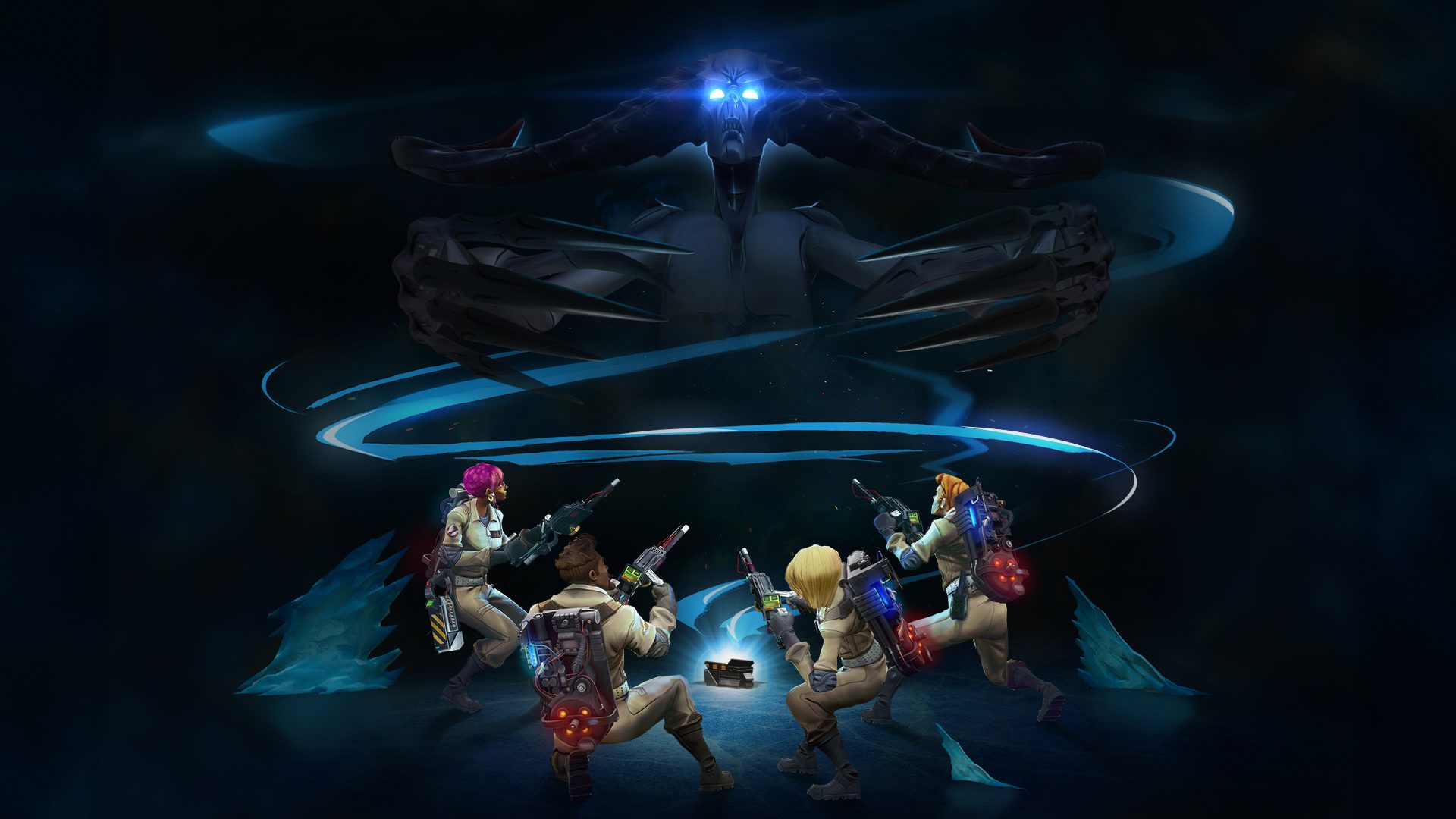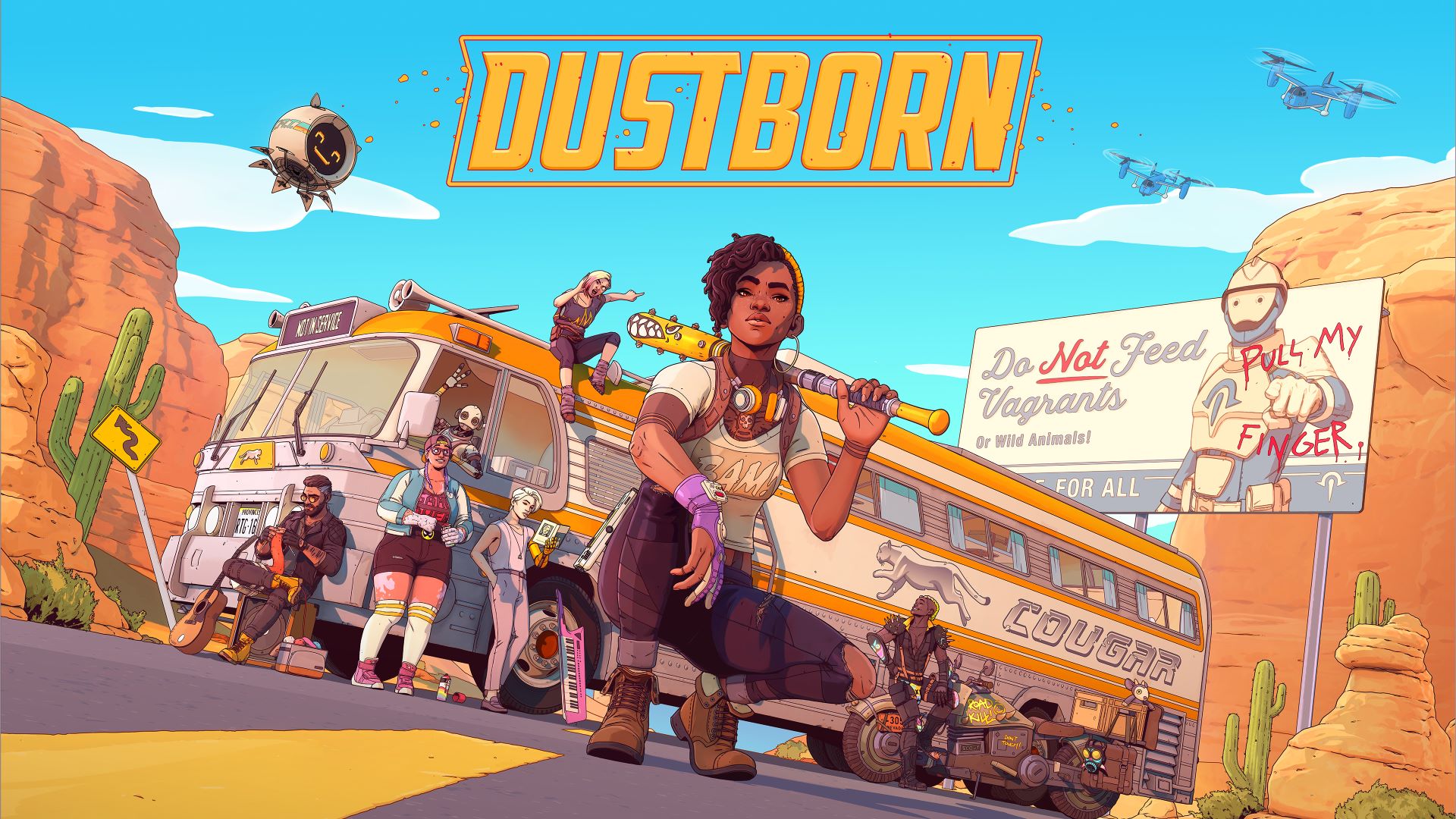
Summary
- Dustborn is the new narrative driven action-adventure game developed by Red Thread Games and published under the label Spotlight by Quantic Dream.
- Coming to Xbox Series X|S and Xbox One on August 20
- The game’s Art Director, Christoffer Grav, gives an exclusive interview on the game’s unique graphic novel art style
Dustborn is a new narrative title coming to Xbox later this year, an explosive adventure in which a group of misfits with superhuman powers attempt to cross a dystopian America to deliver a mysterious package. As the Art Director at the studio Red Thread Games, Christoffer Grav has played a key role in shaping Dustborn, not only its memorable characters and dialogue, but the unique aesthetic of its world is also at the heart of the game’s experience.
Imagined by the game’s Creative Director Ragnar Tørnquist, Dustborn initially took on a dark tone, before evolving to focus on the interpersonal connections between lead character Pax and her crew: “The art direction was initially a bit more gloomy and pessimistic – it was not cell-shaded or in a comic book style,” admits Grav.
However, as the story became lighter and more focused on human connections, Dustborn began to “look more positive with bright colors, a cleaner look, and a colorful palette” according to Grav. “I wanted to go in that direction because it’s my own style as an illustrator, very comic book influenced. I wanted to do something that felt super close to me. I basically wanted to bring my 2D style to the 3D space.”
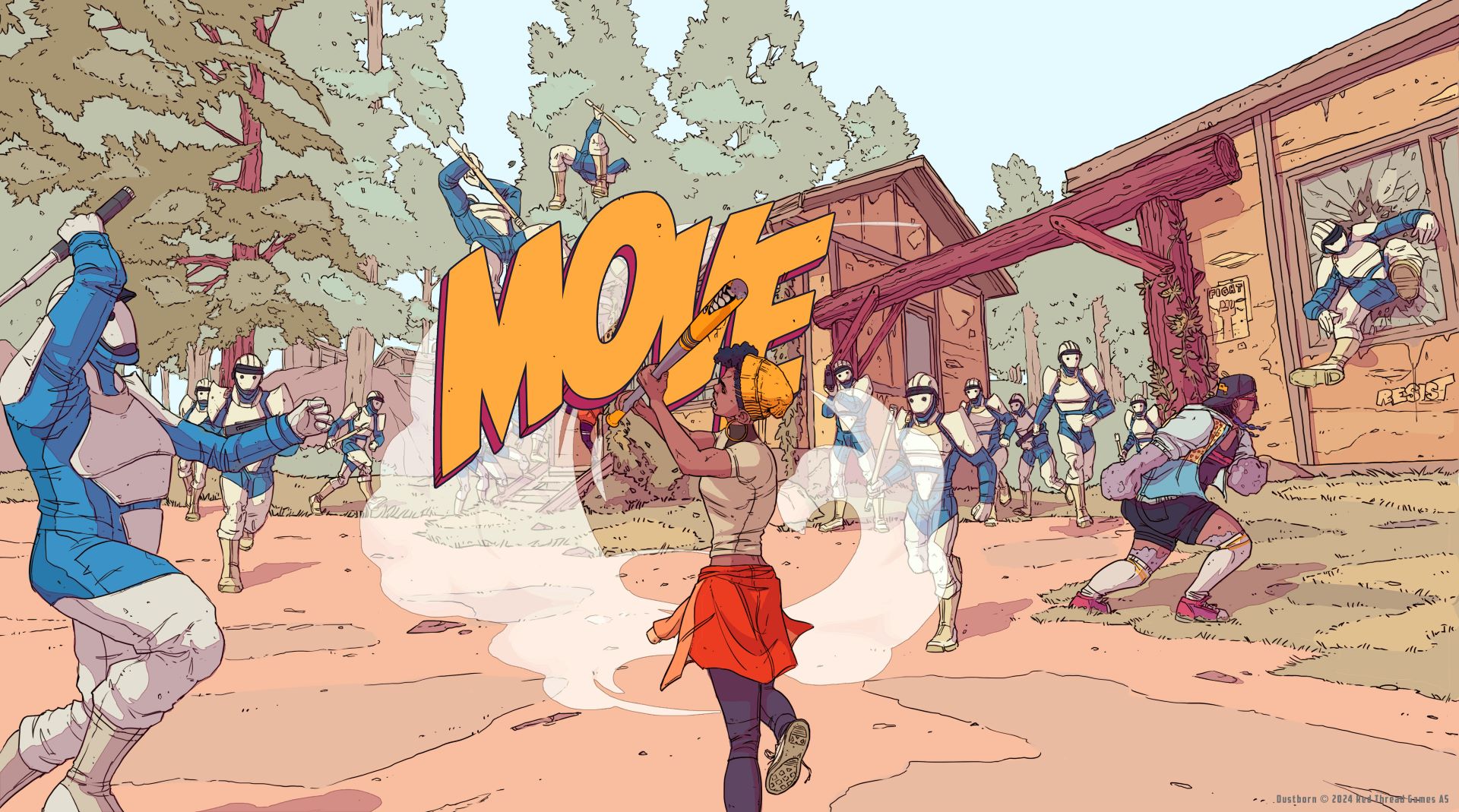
A product of the 80s and their pop aesthetics, Grav brought a vibrant tone to Dustborn, inspired by past influences, “I’m a nerd for Disney, always have been. And I was this huge comic geek when I was younger; while growing up in Norway, my grandfather used to collect French and Belgian comics, like Asterix and Tintin.”
Grav’s mood board also featured many artworks from the French comic book legend Moebius, which he discovered through his grandfather’s comic collection. As he grew older, he also took inspiration from American creators: “There were not many comics imported to Norway when I was a kid, but eventually we got an official translation of [Todd McFarlane’s] Spawn, it was one of the first American comics to be sold in grocery stores, and it just blew my mind! The art, the story, I quickly tried to emulate that style.”
As more American comics made their way to Oslo, Grav devoured them, “I started collecting comics like Gen 13, Witchblade… So, it’s nice to take inspiration from so many different works with Dustborn. Of course, today many games are inspired by comics, but I hope my work will stand out for the way it mixes influences from both America and Europe, with their clear lines.”
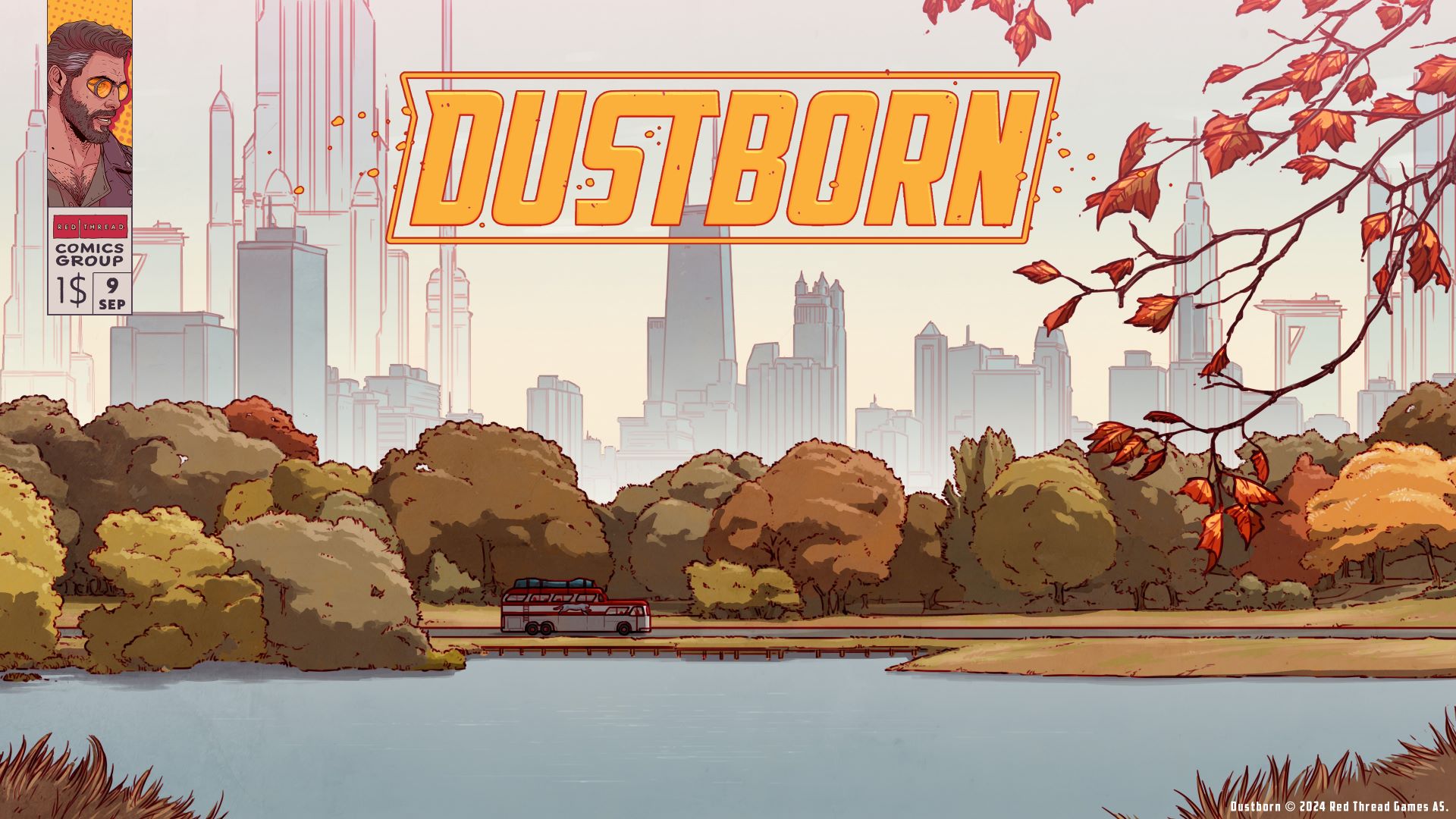
The game’s comic inspired aesthetics accentuate the subversive side of Dustborn, which takes place in a dystopian Justice-driven ‘Divided States of America’, filled with dystopian propaganda. It was a playground for an artist educated as a graphic designer: “Of course I took inspiration from past world conflicts and dictatorships, but it’s more something looming in the background. There’s no big bad guy in Dustborn, it’s more about the people and the way they interact with each other. That’s why Justice officers have a smile on their face: the State wants them to be seen as a positive force. They even have a mascot! With Dustborn, I’ve really put a variety of influences across all mediums, from anime, to movies, series, books, comics, through many decades that inspired me,” explains Grav.
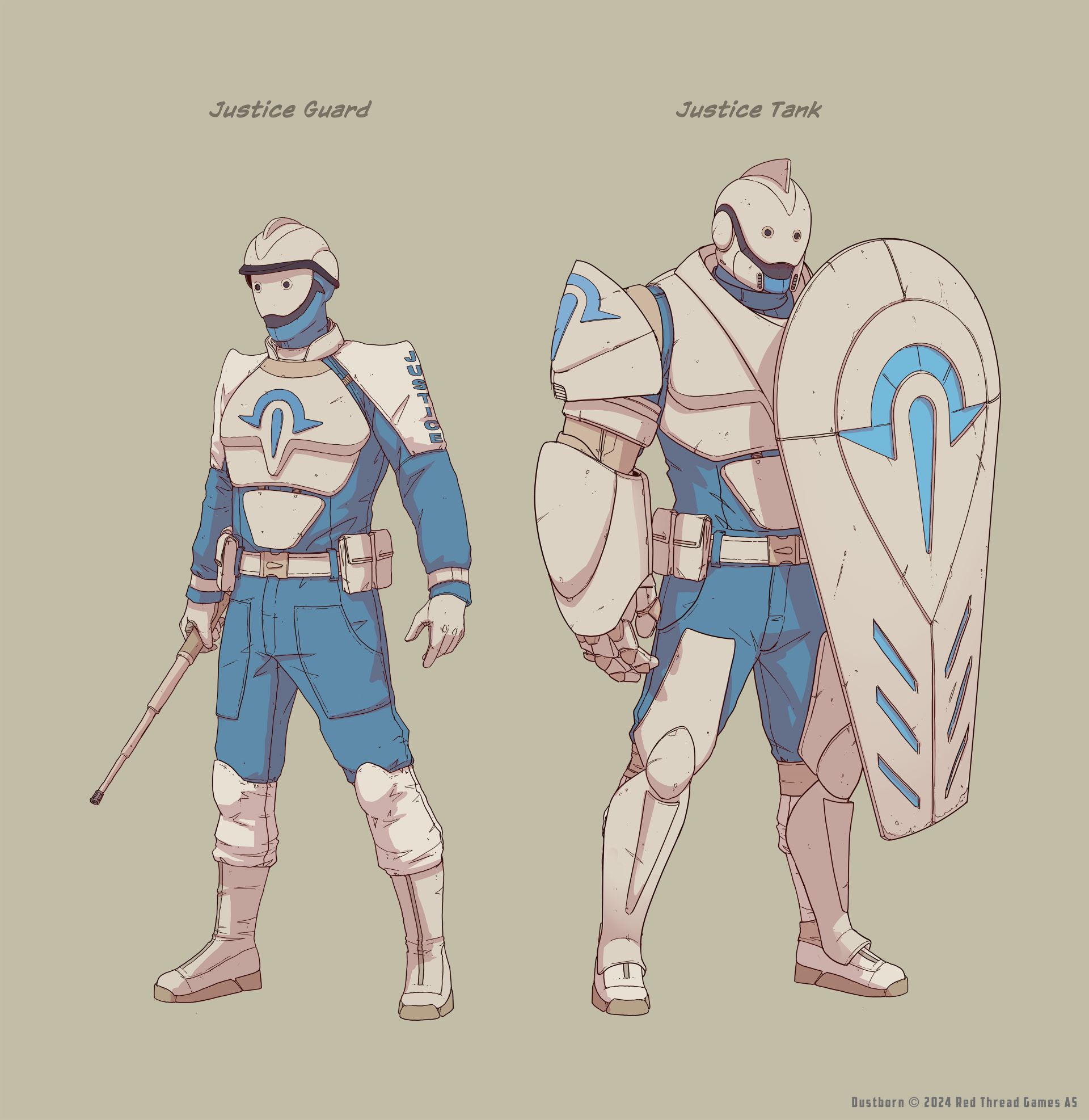
Finally, the crew. Pax and the members of her found family each bring their unique contribution to the table, with their complementary powers, identities, strong points of view and yes, flaws. Humans, after all. To achieve its narrative and artistic goals, Dustborn brought together a diverse group of writers and voice actors, and the team is committed to including a wide range of perspectives in the game.
“Representation is super important to me; growing up as a gay person, there was nothing on TV or in entertainment that reflected my experience,” explained Grav. “As a queer kid, I went through hard times at school and, seeing the direction the world is heading today with LGBTQ+ and other fundamental rights still at risk, I think it’s even more important to focus on representation, especially in video games.”
When working on Dustborn, Grav and his teammates would often challenge each other to bring more perspectives to the experience while ensuring they were authentically representing the game’s characters. They wanted to create a game that portrays the diversity of the world we live in, with a variety of genders, ethnicities, sexual orientations, appearances, attitudes – a game that would have made younger Grav feel included. Before ending, he shared his hope that “people will see themselves in these characters or be inspired by them.” Quite an achievement for the kid who dreamt of seeing himself in comic books, games and beyond.
Dustborn arrives on Xbox Series X|S and Xbox One on August 20.
Summary
- Dustborn is the new narrative driven action-adventure game developed by Red Thread Games and published under the label Spotlight by Quantic Dream.
- Coming to Xbox Series X|S and Xbox One on August 20
- The game’s Art Director, Christoffer Grav, gives an exclusive interview on the game’s unique graphic novel art style
Dustborn is a new narrative title coming to Xbox later this year, an explosive adventure in which a group of misfits with superhuman powers attempt to cross a dystopian America to deliver a mysterious package. As the Art Director at the studio Red Thread Games, Christoffer Grav has played a key role in shaping Dustborn, not only its memorable characters and dialogue, but the unique aesthetic of its world is also at the heart of the game’s experience.
Imagined by the game’s Creative Director Ragnar Tørnquist, Dustborn initially took on a dark tone, before evolving to focus on the interpersonal connections between lead character Pax and her crew: “The art direction was initially a bit more gloomy and pessimistic – it was not cell-shaded or in a comic book style,” admits Grav.
However, as the story became lighter and more focused on human connections, Dustborn began to “look more positive with bright colors, a cleaner look, and a colorful palette” according to Grav. “I wanted to go in that direction because it’s my own style as an illustrator, very comic book influenced. I wanted to do something that felt super close to me. I basically wanted to bring my 2D style to the 3D space.”

A product of the 80s and their pop aesthetics, Grav brought a vibrant tone to Dustborn, inspired by past influences, “I’m a nerd for Disney, always have been. And I was this huge comic geek when I was younger; while growing up in Norway, my grandfather used to collect French and Belgian comics, like Asterix and Tintin.”
Grav’s mood board also featured many artworks from the French comic book legend Moebius, which he discovered through his grandfather’s comic collection. As he grew older, he also took inspiration from American creators: “There were not many comics imported to Norway when I was a kid, but eventually we got an official translation of [Todd McFarlane’s] Spawn, it was one of the first American comics to be sold in grocery stores, and it just blew my mind! The art, the story, I quickly tried to emulate that style.”
As more American comics made their way to Oslo, Grav devoured them, “I started collecting comics like Gen 13, Witchblade… So, it’s nice to take inspiration from so many different works with Dustborn. Of course, today many games are inspired by comics, but I hope my work will stand out for the way it mixes influences from both America and Europe, with their clear lines.”

The game’s comic inspired aesthetics accentuate the subversive side of Dustborn, which takes place in a dystopian Justice-driven ‘Divided States of America’, filled with dystopian propaganda. It was a playground for an artist educated as a graphic designer: “Of course I took inspiration from past world conflicts and dictatorships, but it’s more something looming in the background. There’s no big bad guy in Dustborn, it’s more about the people and the way they interact with each other. That’s why Justice officers have a smile on their face: the State wants them to be seen as a positive force. They even have a mascot! With Dustborn, I’ve really put a variety of influences across all mediums, from anime, to movies, series, books, comics, through many decades that inspired me,” explains Grav.

Finally, the crew. Pax and the members of her found family each bring their unique contribution to the table, with their complementary powers, identities, strong points of view and yes, flaws. Humans, after all. To achieve its narrative and artistic goals, Dustborn brought together a diverse group of writers and voice actors, and the team is committed to including a wide range of perspectives in the game.
“Representation is super important to me; growing up as a gay person, there was nothing on TV or in entertainment that reflected my experience,” explained Grav. “As a queer kid, I went through hard times at school and, seeing the direction the world is heading today with LGBTQ+ and other fundamental rights still at risk, I think it’s even more important to focus on representation, especially in video games.”
When working on Dustborn, Grav and his teammates would often challenge each other to bring more perspectives to the experience while ensuring they were authentically representing the game’s characters. They wanted to create a game that portrays the diversity of the world we live in, with a variety of genders, ethnicities, sexual orientations, appearances, attitudes – a game that would have made younger Grav feel included. Before ending, he shared his hope that “people will see themselves in these characters or be inspired by them.” Quite an achievement for the kid who dreamt of seeing himself in comic books, games and beyond.
Dustborn arrives on Xbox Series X|S and Xbox One on August 20.

